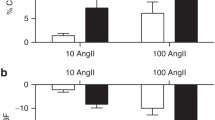Abstract.
The present study was designed to investigate the effects of chronic administration of the arginine analogue L-Name (50 mg/kg body weight), the angiotensin converting enzyme inhibitor, perindopril (2 mg/kg body weight), and perindopril (2 mg/kg) plus L-Name (50 mg/kg) on blood pressure, plasma renin activity, plasma angiotensinogen, and hepatic angiotensinogen mRNA levels in young and adult rats. The drugs were given daily from birth to day 21 to puppies and for 15 days to adults. Analytical procedures were performed on day 21 for the puppies and at 10 weeks for the adults. In puppies, blood pressure did not change with L-Name, it decreased to 45% of control values (P <0.001) with perindopril, and decreased to 77% of control values (P <0.05) with perindopril plus L-Name. In adults, blood pressure increased to 129% of control values (P <0.02) with L-Name, decreased to 80% of control values (P <0.05) with perindopril, and did not change with perindopril plus L-Name. Compared with controls, plasma renin activity was unchanged in puppies and adults with L-Name, undetectable in puppies and slightly increased in adults with perindopril, undetectable in puppies and slightly decreased in adults with perindopril plus L-Name. With L-Name, angiotensinogen mRNA levels were unchanged in puppies and slightly increased in adults, while plasma angiotensinogen levels were decreased (P <0.05) in puppies and increased (P <0.01) in adults; with perindopril, angiotensinogen mRNA levels were unchanged in puppies and slightly decreased in adults, while plasma angiotensinogen levels were undetectable in puppies and decreased (P <0.05) in adults; with perindopril plus L-Name, angiotensinogen mRNA levels were unchanged in puppies while plasma angiotensinogen levels were undetectable in puppies and decreased (P <0.01) in adults. This study suggests that during the early postnatal period (1) nitric oxide does not exert a basal vasodilator tone but contributes to the hypotensive state induced by perindopril, (2) angiotensin II is essential to maintain blood pressure, (3) and angiotensinogen mRNA levels are not influenced by nitric oxide or angiotensin II.
Similar content being viewed by others
Author information
Authors and Affiliations
Additional information
Received April 10, 1996; received in revised form February 28, 1997; accepted March 14, 1997
Rights and permissions
About this article
Cite this article
Charbit, M., Blazy, I., Gogusev, J. et al. Nitric oxide and the renin angiotensin system: contributions to blood pressure in the young rat. Pediatr Nephrol 11, 617–622 (1997). https://doi.org/10.1007/s004670050349
Issue Date:
DOI: https://doi.org/10.1007/s004670050349




